More than one million Uighurs have been disappeared into China’s internment camps in Xinjiang province according to UN estimates. An exclusive Deutsche Welle investigation (above) reveals how many were tried for alleged “crimes” in sham trials.
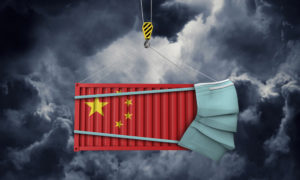
NED Forum/shutterstock
The pandemic has marked a pause in the wave of unco-ordinated but simultaneous protest movements that crossed much of the world last year. They seem to be resuming, starting in America. Its position as the sole superpower may be under threat. But its political agonies still sway opinion around the world, The Economist adds:
China in particular relished accusing America of hypocrisy. The timing was poignant. On May 28th China’s parliament rubber-stamped a proposal to impose a security law on Hong Kong that America insisted robbed the territory of the autonomy it was promised. June 4th marked the anniversary of the Tiananmen massacre in 1989. Mike Pompeo, America’s secretary of state, undeterred by the irony that America now appeared far more likely than China to deploy armoured vehicles against peaceful protesters in its national capital, observed the date by meeting veterans of China’s democracy movement.
Hong Kong artists based in Europe are launching an online art platform to mark the first anniversary of the territory’s pro-democracy protests and raise awareness among the international artistic community of the looming national security law imposed by Beijing. More than 1,500 cultural workers in Hong Kong signed a petition expressing “shock, worry and anger” that China’s new national security law will further erode the city’s autonomy and restrict creative freedom, The Art Newspaper reports:
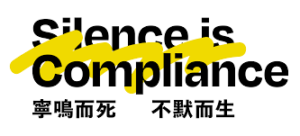 Entitled Silence is Compliance, the platform will launch on 12 June with live-streamed performances and an online gallery showing works primarily by Hong Kong artists and creatives. A visual essay will illustrate the city’s protests against the now-withdrawn extradition bill from various angles through the lens of artists, researchers and local people. The project is led by Young Blood Initiative, an organisation operating from Amsterdam, London and Berlin, in collaboration with the We Are HKers website and Hong Kong-based publishing collective Zine Coop.
Entitled Silence is Compliance, the platform will launch on 12 June with live-streamed performances and an online gallery showing works primarily by Hong Kong artists and creatives. A visual essay will illustrate the city’s protests against the now-withdrawn extradition bill from various angles through the lens of artists, researchers and local people. The project is led by Young Blood Initiative, an organisation operating from Amsterdam, London and Berlin, in collaboration with the We Are HKers website and Hong Kong-based publishing collective Zine Coop.
“It has shaken many of us. Hong Kong is at the forefront in the global fight against totalitarianism,” said Candy Choi, the founder of Young Blood Initiative.
 The Raoul Wallenberg Centre for Human Rights will be hosting a major online conference on Tuesday, June 9 from 5:00-8:00 PM EDT bringing together some of the world’s leading voices to address human rights in China during the Coronavirus pandemic.
The Raoul Wallenberg Centre for Human Rights will be hosting a major online conference on Tuesday, June 9 from 5:00-8:00 PM EDT bringing together some of the world’s leading voices to address human rights in China during the Coronavirus pandemic.
The webinar will consist of three panels: China’s attempt to quarantine the truth and increasing threats against the media and journalists; China’s political prisoners and mistreatment of minorities; and identifying ways to hold the Chinese government accountable for the pandemic and human rights abuses.
China at a Crossroads: Standing up for Human Rights During the Pandemic
Program:
1) China’s attempt to quarantine the truth and increasing threats against the media and journalists
Moderator: Judith Abitan, Raoul Wallenberg Centre for Human Rights (RWCHR)
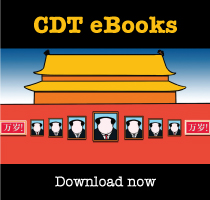 – Xiao Qiang, Director and Research Scientist at Counter-Power Lab at UC Berkeley, Founder and Editor of China Digital Times
– Xiao Qiang, Director and Research Scientist at Counter-Power Lab at UC Berkeley, Founder and Editor of China Digital Times
– Sarah Cook, Senior Research Analyst for China at Freedom House and Director of China Media Bulletin
– Chris Walker, Vice President, Studies and Analysis, National Endowment for Democracy
2) China’s political prisoners and mistreatment of minorities
Moderator: Kyle Matthews, Montreal Institute for Genocide Studies and Human Rights (MIGS)
– Jewher Ilham, Human rights activist and author whose father, an Uyghur scholar, is detained by the Chinese state
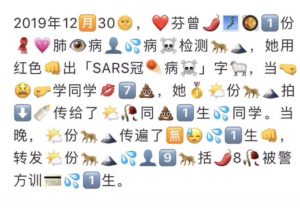
Credit: FreedomHouse
– Naomi Kikoler, Director of the Simon-Skjodt Center for the Prevention of Genocide at the US Holocaust Memorial Museum
– Emily Lau, Journalist and First Woman elected to the Hong Kong Legislative Council
3) Identifying ways to hold the Chinese government accountable for the pandemic and human rights abuses
Moderator: Terry Glavin, journalist and RWCHR Senior Fellow
– Kimberly Kitching , Australian Senator and Chair of the Foreign Affairs, Defence and Trade References Committee
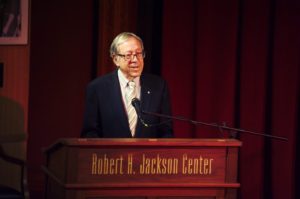 – Irwin Cotler, (right), Chair of the Raoul Wallenberg Centre for Human Rights, Former Minister of Justice and Attorney General of Canada and longtime Parliamentarian
– Irwin Cotler, (right), Chair of the Raoul Wallenberg Centre for Human Rights, Former Minister of Justice and Attorney General of Canada and longtime Parliamentarian
– Carl Gershman, President of National Endowment for Democracy
– Sheng Xue, Chairperson of International Federation for a Democratic China
Registration for the event is required: Click Here
This event is hosted and co-sponsored by the Montreal Institute for Genocide and Human Rights Studies, Freedom House, the National Endowment for Democracy, China Digital Times, the Geneva Summit for Human Rights and Democracy, the Uyghur Rights Advocacy Project, Canada Tibet Committee, International Coalition to End Transplant Abuse in China, the Federation for a Democratic China and the Nobel Women’s Initiative.







